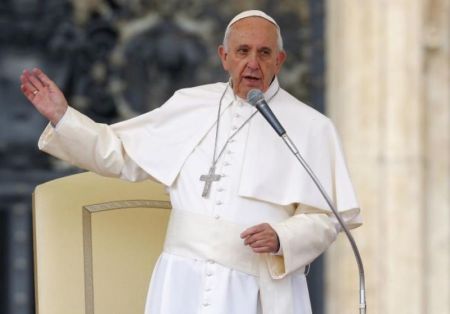Pope Francis formalizes women's roles at mass, maintains men-only priesthood

Pope Francis has officially changed Catholic Church law to allow women to be permanently installed as lectors or acolytes during mass, while maintaining that only men can be ordained as priests.
Although many Catholic congregations already allowed for women to serve as Bible readers or altar servers during mass, Francis' decree merely formalizes the ability of women to permanently serve in those roles as full-time positions and prevents "bishops from choosing to restrict women from those ministries," according to The Jesuit Review.
“Pope Francis wanted to formalize and institutionalize the presence of women at the altar,” explained Vatican News regarding the new law.
“Francis, therefore, establishes that women can have access to these ministries and that this be recognized through a liturgical act formally instituting them as such.”
Despite expanding the role of women in the mass, Francis reaffirmed the Catholic Church's position against female ordination, quoting an earlier papal document stating that it “does not consider herself authorized to admit women to priestly ordination.”
On Monday, in an official letter by the pontiff to the Prefect of the Congregation for the Doctrine of the Faith, Francis formally recognized the Catholic worship service roles for women.
“I considered it appropriate to establish that not only men but also women can be instituted as Lectors or Acolytes, in whom, through the discernment of the pastors and after adequate preparation, the Church recognizes ‘the firm will to serve God and the Christian people faithfully,’” stated the letter.
“The decision to confer these offices on women as well, entailing stability, public recognition and a mandate from the bishop, makes the participation of all in the work of evangelization more effective in the Church.”
Francis explained that he believed opening those roles to women “will increase the recognition, also through a liturgical act (institution), of the valuable contribution that a great number of lay persons, including women, have offered to the life and mission of the Church for a very long time.”
“It will be the task of the Episcopal Conferences to establish adequate criteria for the discernment and preparation of candidates for the ministries of the Lectorate or Acolytate, or other ministries which they deem to be instituted,” he continued.
Since becoming leader of the Roman Catholic Church, Francis has been noted for his expanding of the role of women in the institutions of the global religious body.
For example, in August 2020, Francis appointed six women to the Council for the Economy, a high-level financial issues body in the Catholic Church that was created in 2014.
In addition to the six women, the membership of the Council will include one male lay leader and eight cardinals, which include Cardinal Joseph Tobin of New Jersey.
“I see their nomination as an effort by Pope Francis to ensure greater opportunities for women to offer their gifts in service to the church,” said Tobin to the National Catholic Reporter last year.
“He clearly considers the academic formation and vast experience of these colleagues as crucial contributions to one of his cherished priorities, the ongoing reform of the financial administration of the Holy See.”





















